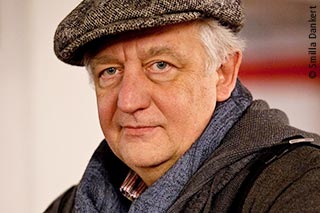Today's ideas. Tomorrow's impact. This is the motto of the Wiso Faculty and in this times there is hardly any other topic where the impact of an idea can be seen as clearly as in the case of ILIAS. The „Integrated Learning, Information and Work Cooperation System“ (Integrated learning, information and working cooperation system) is a worldwide success and without ILIAS online teaching at universities would hardly be conceivable all over the world. The system was developed in the late 1990s by a team around Professor Wolfgang Leidhold at the Chair of Political Theory and History of Ideas of the WiSo Faculty. We talked to the ILIAS inventor about how an idea can change the world, what his relationship is to his project today and how important it is to leave well-trodden paths in order to go your own way.
Dear Professor Leidhold,
Professor Leidhold, public business development agencies often use the term "secret stars" when discussing hidden global market leaders in their area. When looking at "ILIAS," do you sometimes feel like a "secret star"?
Wolfgang Leidhold: I simply enjoy innovation and am, therefore, pleased that ILIAS has enjoyed such global success. Does that make me a "secret star"? I’ll let others be the judge of that.
You developed ILIAS in 1997/98 at the Chair of Political Theory and History of Ideas. How did this come about? How did you, as a political scientist, come to develop complex software?
Wolfgang Leidhold: I was interested in developing internet-based software, which could be utilised in education, and was, above all, interested in doing so from the perspective of the users. My guiding questions were: How do you make it suitable for a university? And, how do you convince the academic community to join in? My team and I started with an organisational model and a technical vision. We then tried to bring them both under one roof.
Can you describe the development process? What was particularly important and who was involved?
Wolfgang Leidhold: By the mid 90s, it was common practice to build websites using HTML. This method is extremely inflexible. If you want to change the content, you have to constantly tinker with the code. Instead, we wanted to create a stable interface and generate the content on-the-fly from a database. That was innovative. We asked some talented and enthusiastic software developers and they said,” No problem, we can do that!” I initiated the "Virtual University-Systems" project (VIRTUS), got the money, we got started, and they got it done.
What challenges have you faced and how have you solved them?
Wolfgang Leidhold: The challenges began with the technical infrastructure. When we started, there were only about 6 million computers on the net worldwide. Back then, high speed internet access was still an eccentric idea at the university. But the computing center of our University and Net-Cologne, a local company, helped us. In terms of software, didactics, and organisation, we broke new ground everywhere. Such a development can only be achieved with an excellent team—and I had the best team ever! Alex Tödt, Mathias Kunkel and Philipp Kröpelin focused on concept and organisation. Alex Killing, Boris Schürmann and Claudius Weinberger did the programming. Joachim von Kiedrowski solved the didactic problems; Lorenz Gräf developed usability tests. All of them were pioneers.
What were the exact goals of the VIRTUS project and were these goals achieved with ILIAS from your perspective?
Wolfgang Leidhold: We did not set any fixed objectives; we had only a strategic vision, and then continuously exchanged ideas with the users. So, we presented our vision and asked the user community: What do you think about it? In this way, we developed the software step by step and ensured user acceptance.
The learning management system is now used in about 71 educational institutions in various countries. Would you have expected such success?
Wolfgang Leidhold: Actually, the success is even greater. These 71 institutions are only the registered members of the ILIAS community that actively participate in the technical evolution. However, ILIAS is a free open-source software. Downloads are somewhere in the five to six-digit range. Spin-offs for use and software development have spread as far as China.
To conclude the first part of our interview: Since 2009, ILIAS is supported and developed by ILIAS open source e-Learning e. V., which emerged from the cooperation network ILIAS open source. Did you consciously aim for such an organisational design, and are you still involved with the association?
Wolfgang Leidhold: The organisational design has resulted from our team spirit. We all thought: Research and teaching thrive on the free exchange of ideas. The open source concept works well with this. The association emerged from that team spirit. We are all still friends, many come to my chair's Christmas party every year, and I am still in charge of the nameing rights for ILIAS.
to second part of the interview: "Leave well-trodden paths behind"
